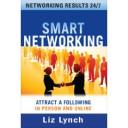 I met Liz Lynch, author of Smart Networking, about 4 years ago after reading her spot on book, 102 Secrets to Smarter Networking and inviting her to speak to a group of HR professionals in transition at the Human Resources Association of New York.
I met Liz Lynch, author of Smart Networking, about 4 years ago after reading her spot on book, 102 Secrets to Smarter Networking and inviting her to speak to a group of HR professionals in transition at the Human Resources Association of New York.
What I loved about Liz and her presentation was her authenticity. None of the strategies she recommended were “gimmicky” and there was a strategy for everyone no matter how uncomfortable they were with the process of networking.
So naturally I was thrilled when I learned that Liz recently published Smart Networking. Liz once again delivers networking tips that can be applied by real people and I will be writing more about this excellent resource later on this week. Last week I had the opportunity to pick her brain on some of the networking questions I know are on job seekers’ minds and Liz graciously shared her thoughts about networking as it relates to job seekers.
What advice do you have for job seekers who have let their networks lapse for several years and now need to reach out to people for help accelerating their job search?
“You’re likely to get help more quickly from those who already know, like and trust you, vs. from total strangers, so start reconnecting with old contacts first. For the people with whom you had strong relationships in the past, they’re probably more willing to spend time with you in person or on the phone to discuss your career plans, so contact them directly. For those with whom you have weaker ties, connecting with them on LinkedIn first is a lot less intrusive than sending a direct email because you’re just inviting them to connect, not asking for anything. You can build up to that later.”
What advice do you have for people who reach out to their network but claim they get nothing in return?
“The most important skill that smart networkers should master is the art of the ask, where you think strategically about who to ask, what to ask for and how to ask. For example, when you’re not getting help, then evaluate, “Is what I’m asking for reasonable? Is it specific?” When most job seekers reach out to contacts, they say, “I’m looking for a job, can you help me?” But realistically, very few people have a job in their back pocket for you, so asking for one is unreasonable. In terms of getting more specific, would you like advice on what to highlight on your resume or an introduction to a specific person at your target company? It’s up to you think through what would be appropriate based on the closeness of your relationship and the capabilities of the other person.”
What tips do you have for reaching out to networking contacts when everyone is so busy and reluctant to take yet another meeting?
“This goes back to the art of the ask. Realize that it is an imposition to ask someone who isn’t your best friend or a relative to spend two hours with you at lunch. So why not ask for something smaller? Most people would be willing to agree to a 10-15 min phone call. That shorter timeframe forces you to be prepared in advance and laser-focused about your meeting agenda. It’s even possible to get as much accomplished than you would in an unfocused two-hour meeting.”
What do you tell people who think that networking is too time consuming?
“Don’t confuse activity with progress. Just because you clock in a lot of hours, it doesn’t mean you’re meeting the right people, doing the right things, or doing them in the right way. Evaluate how you’re spending your networking time and either give up the things that aren’t working, or tweak your approach to be more effective. Smart networking is about learning to maximize your face-to-face interactions, while leveraging online tools that can make parts of your networking automatic. By networking smart, you won’t have to network hard.”
What are 3 examples of unlikely but effective places to network?
“1) Holiday parties. The economy may reduce the number of social gatherings this season, but that may not be such a bad things since people are less likely to be partied out. Be mindful of the spirit of the event, however. Focus on building rapport with folks, and leave the hard-core job stuff for later. In other words, don’t bring your resume or corner people for information about potential job openings in their companies. Have low-key conversations, be prepared to talk about yourself when asked, but also express interest in learning more about others.
2) Blogs. Smart networking isn’t just about asking for help appropriately. It’s about being visible and getting the attention of those in influential positions because of the value you’re adding, and having opportunities come to you. Get active on the 1 or 2 most popular blogs in your industry. Leave thoughtful comments. You may just capture the attention of the blog author and other commenters.
3) Community organizations. Get involved in a local group whose mission you believe in. It could be a group that helps underprivileged kids, or one that seeks to preserve historical sites in your area, whatever has meaning for you. Get to know the leaders and other members. Join a committee. When you work and collaborate with others, you’ll be on your way to building genuine and supportive relationships.”
